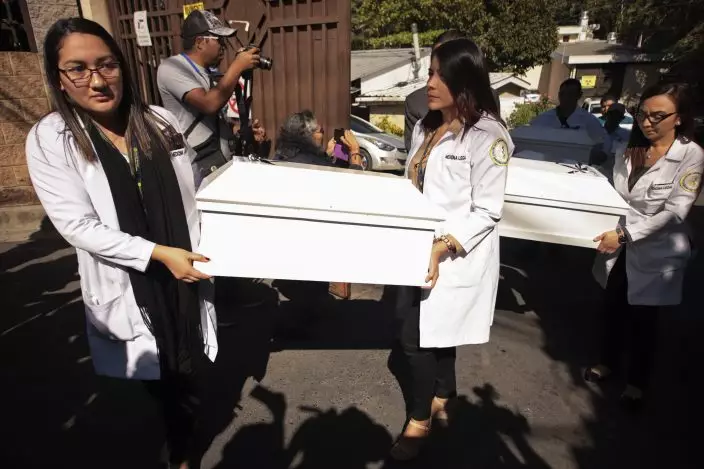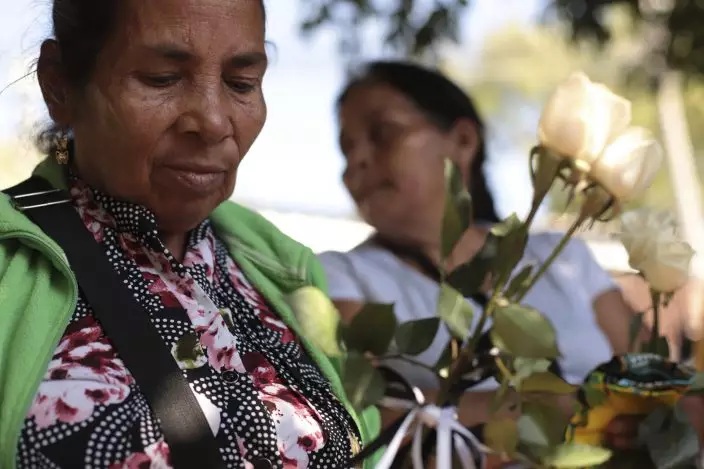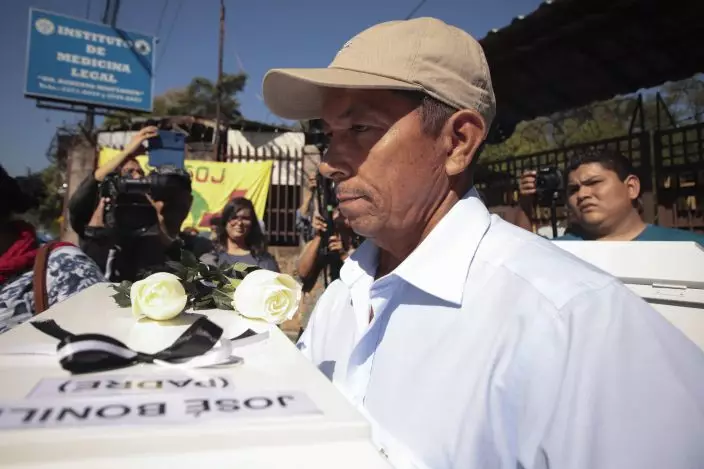El Salvador's forensic institute on Thursday turned over to family members the remains of six of the more than 200 rural residents killed by soldiers in August 1982 El Calabozo massacre.
Juana de Jesús Regaleño Bonilla cried over the caskets of her parents, three sisters and a sister-in-law.
“Thank God we have come to recover the bones of our relatives,” she said.

Small coffins holding the remains of three of six family members who were killed in a 1982 massacre are carried by workers from the forensic office to be handed over to the victims' family in San Salvador, El Salvador, Thursday, Jan. 23, 2020. The remains of six adults and children from one family were handed over to surviving relatives Thursday, 38 years after the El Calabozo massacre, in which government soldiers are accused of killing more than 200 people. (AP PhotoSalvador Melendez)
The remains were exhumed late last year and will be buried in El Calabozo, where soldiers are accused of burning homes and killing mostly women, children and the elderly over several days during the country's civil war.
“It's hard for me to receive their bones, but it gives me strength and I have to be strong to demand justice,” she said. “They were massacred, it was a slaughter of innocent people.” Her sisters were aged 10, 14 and 18 when they were killed and the oldest was pregnant.
“They killed old people, women and children, burned houses, stole everything we had and threw the bodies in the river,” said María Berta Regaleño, another relative.

Juana Bonilla, 66, holds white roses as she waits with her relatives to receive six small coffins containing the remains of their family members who were killed in a 1982 massacre, in San Salvador, El Salvador, Thursday, Jan. 23, 2020. The remains of six adults and children from one family were handed over to surviving relatives Thursday, 38 years after the El Calabozo massacre, in which government soldiers are accused of killing more than 200 people.(AP PhotoSalvador Melendez)
Former human rights prosecutor David Morales who represents the victims, pushed in 2016 for the reopening of the case. A general amnesty had blocked its investigation, but the Supreme Court declared the amnesty unconstitutional. He said the Supreme Court had ordered that the El Calabozo case be reopened and investigated.
A report from the United Nations Truth Commission after the war said “there exists sufficient evidence that on Aug. 22, 1982 soldiers of the Atlacatl Batallion deliberately killed more than 200 civilians, men, women and children it had captured without resistance.”

Fernando Bonilla Realegeno carries a small coffin holding the bones of his father Jose Bonilla, who was killed when Fernando was in his early 20s, as relatives receive the remains of six family members who were killed in a 1982 massacre in San Salvador, El Salvador, Thursday, Jan. 23, 2020. The remains of six adults and children from one family were handed over to surviving relatives Thursday, 38 years after the El Calabozo massacre, in which government soldiers are accused of killing more than 200 people. (AP PhotoSalvador Melendez)


